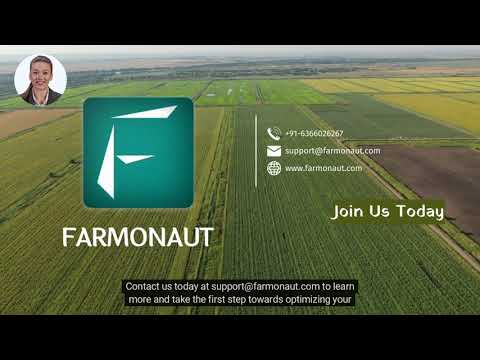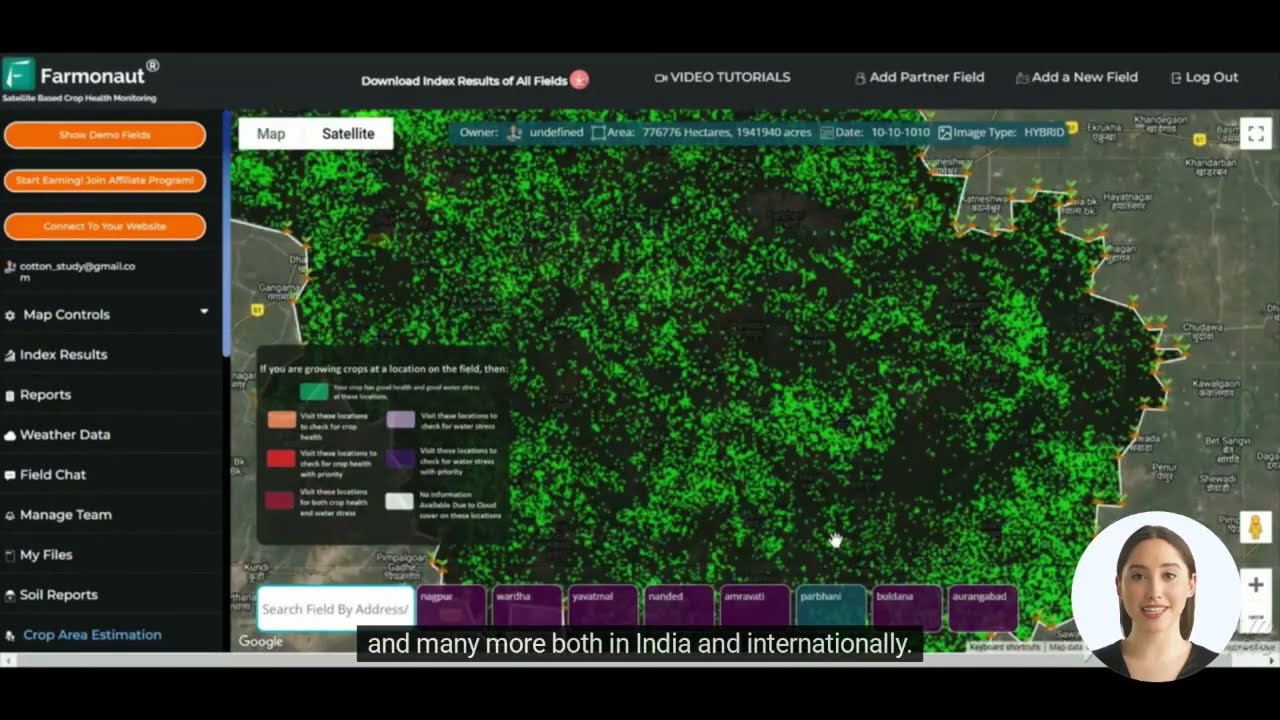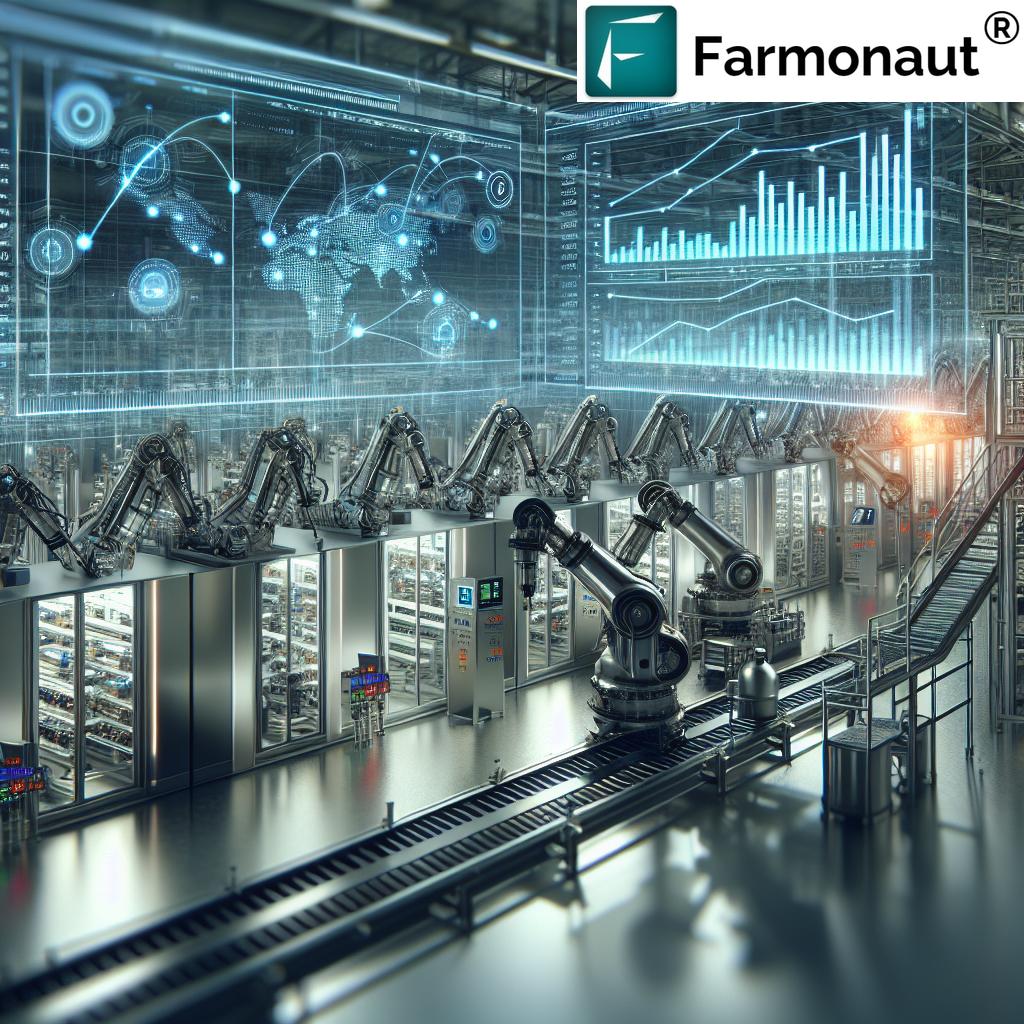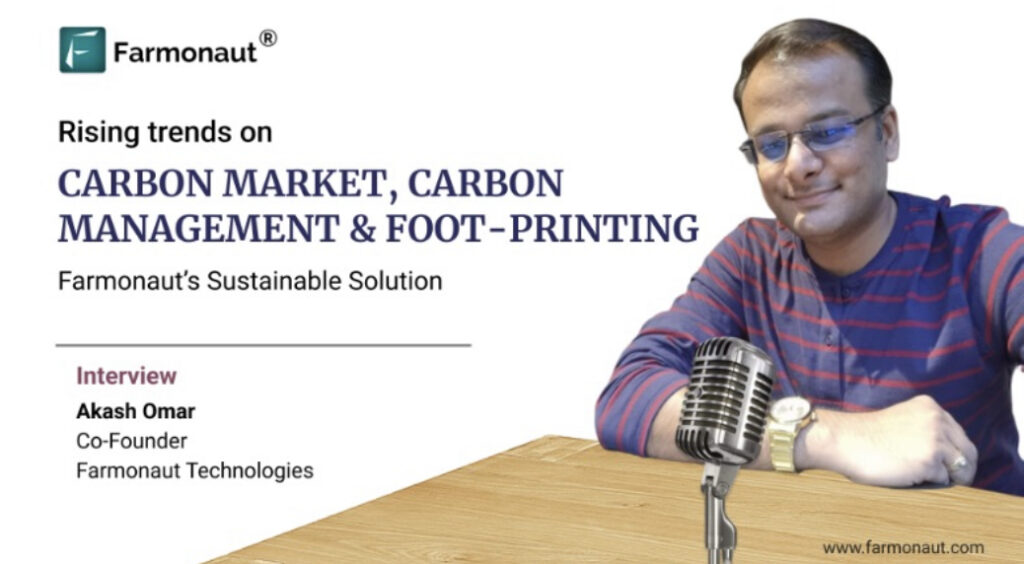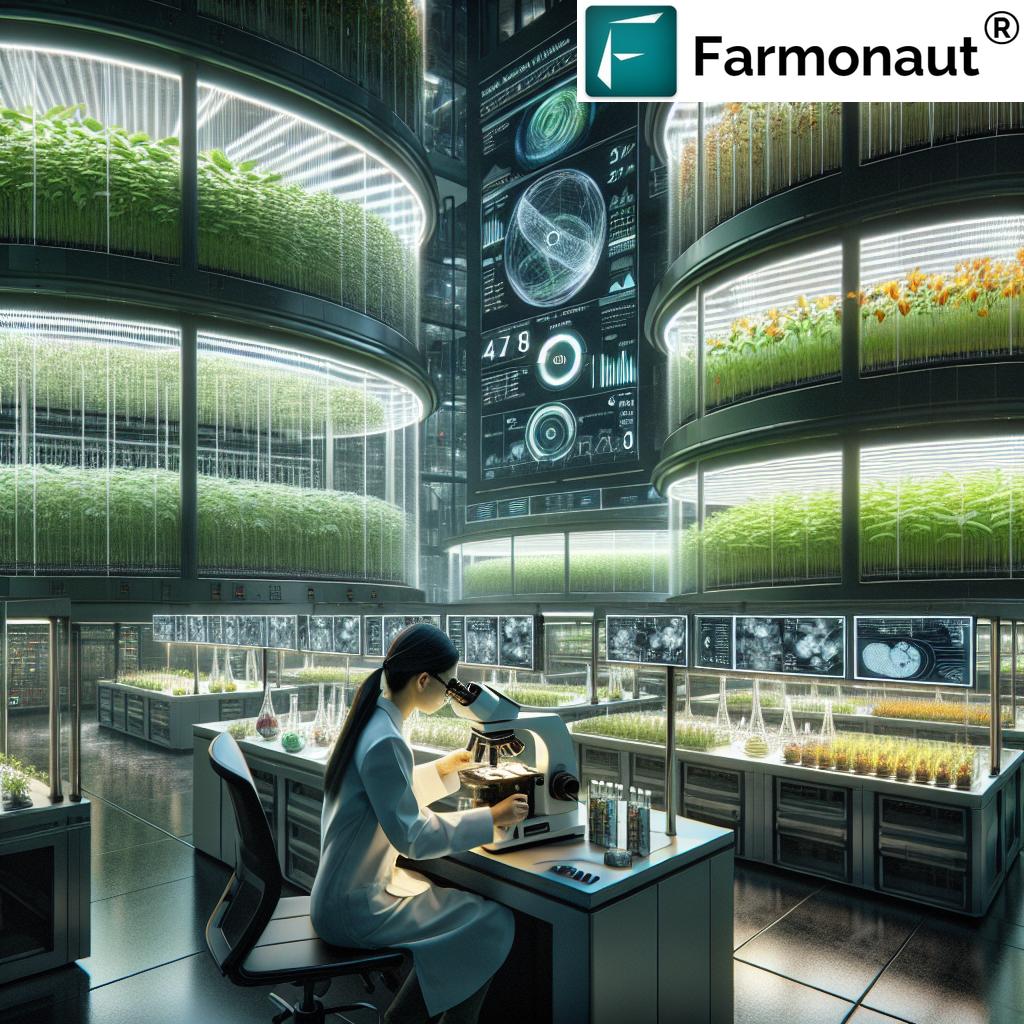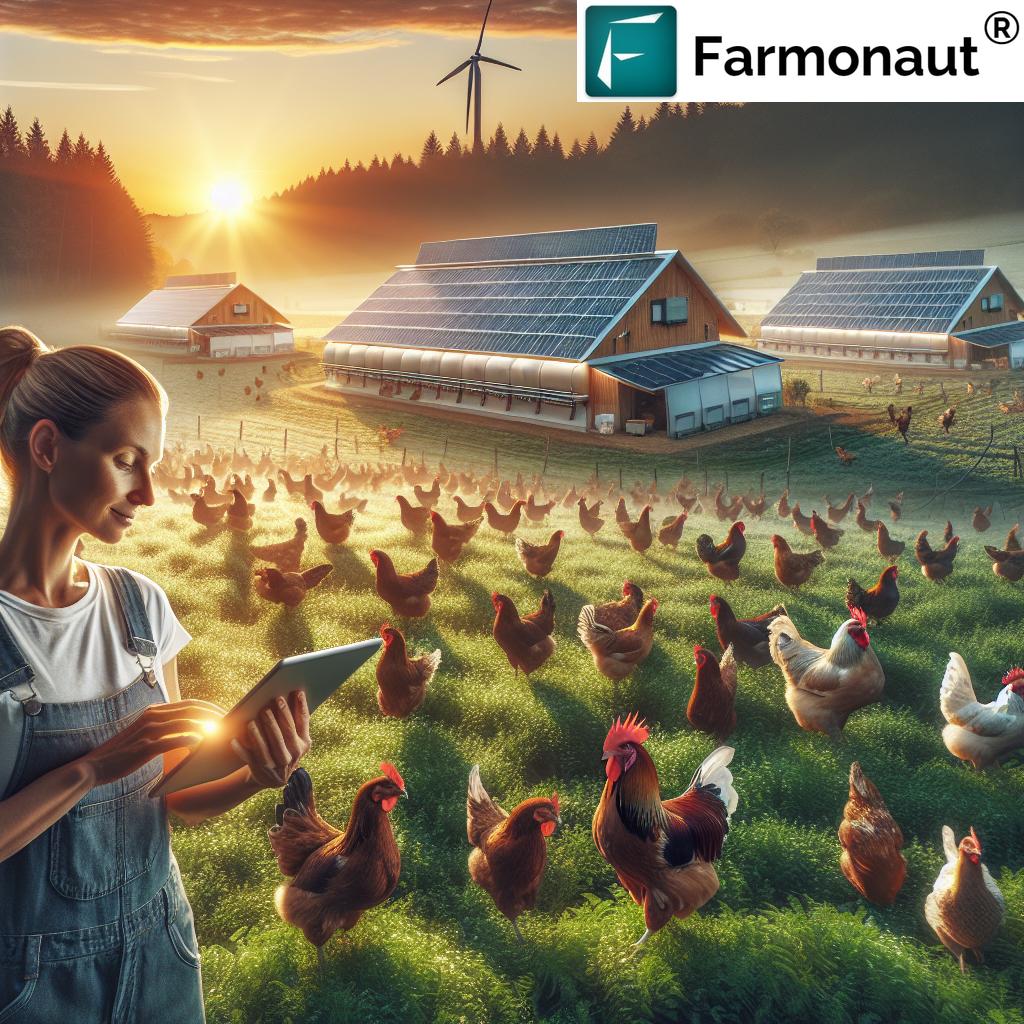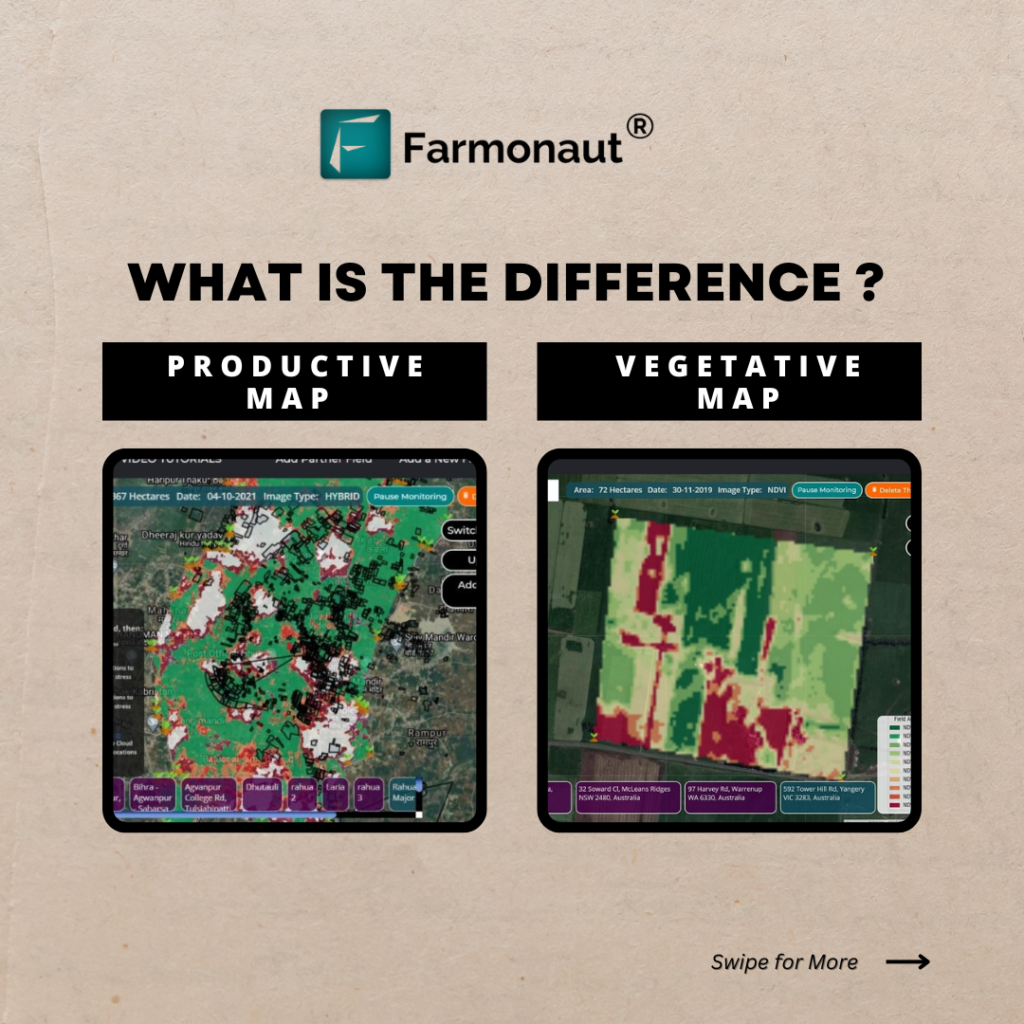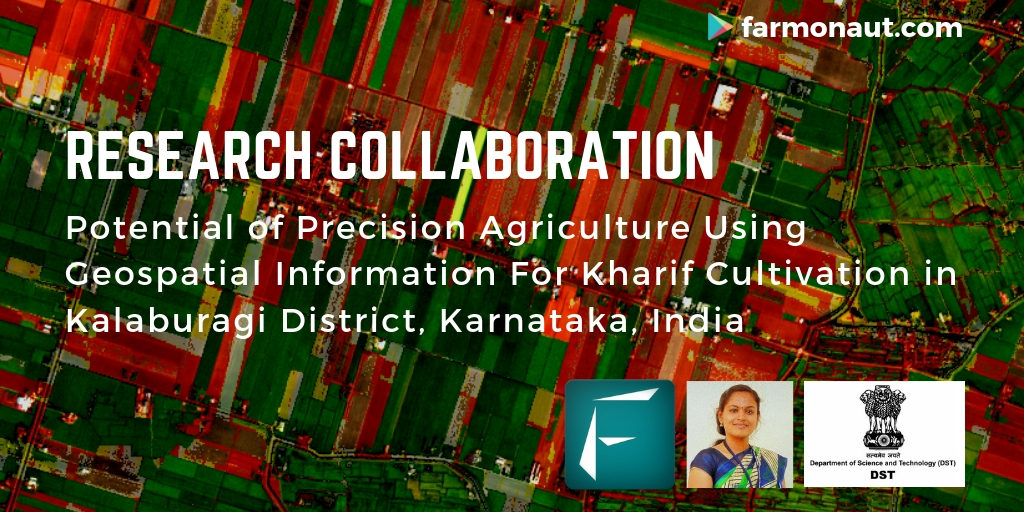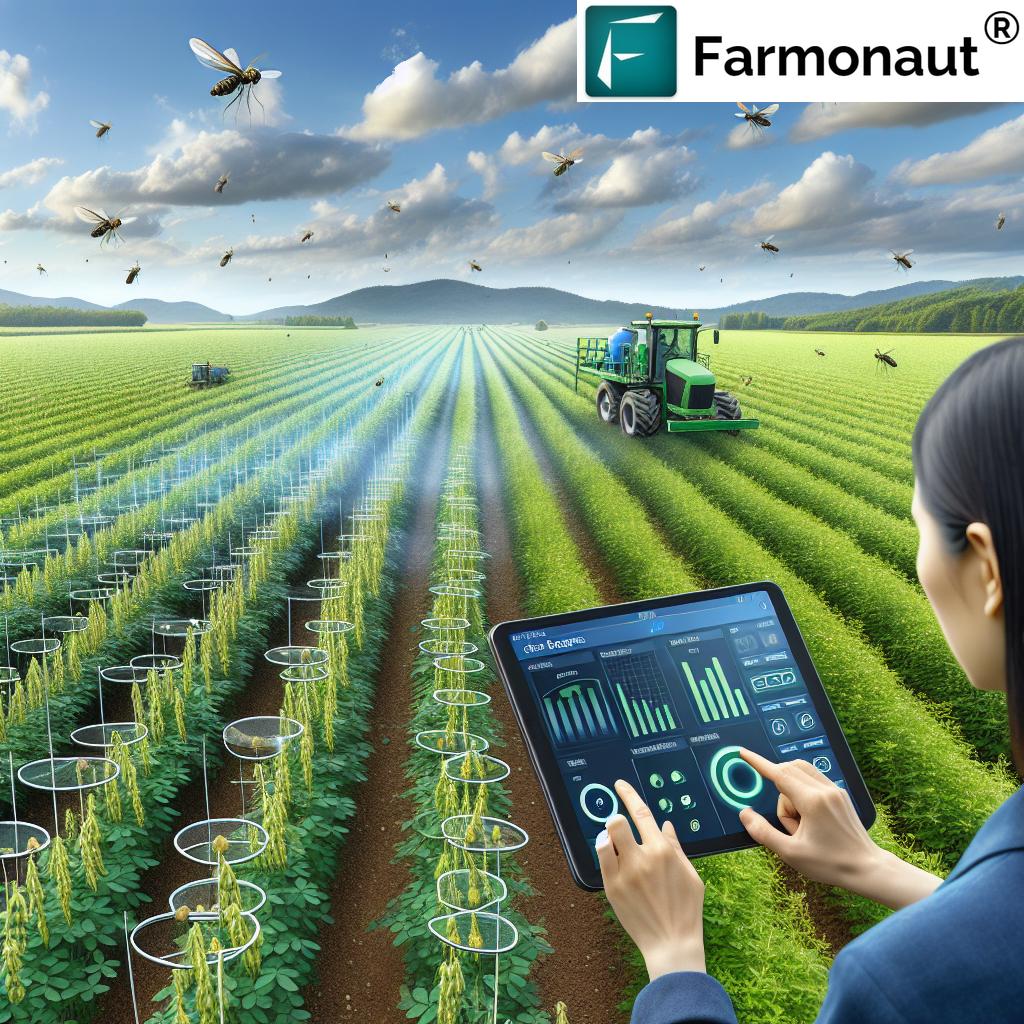Unlock Agricultural Futures: Optimize Crop Yields with Farmonaut’s Precision Farming Tools and Market Insights
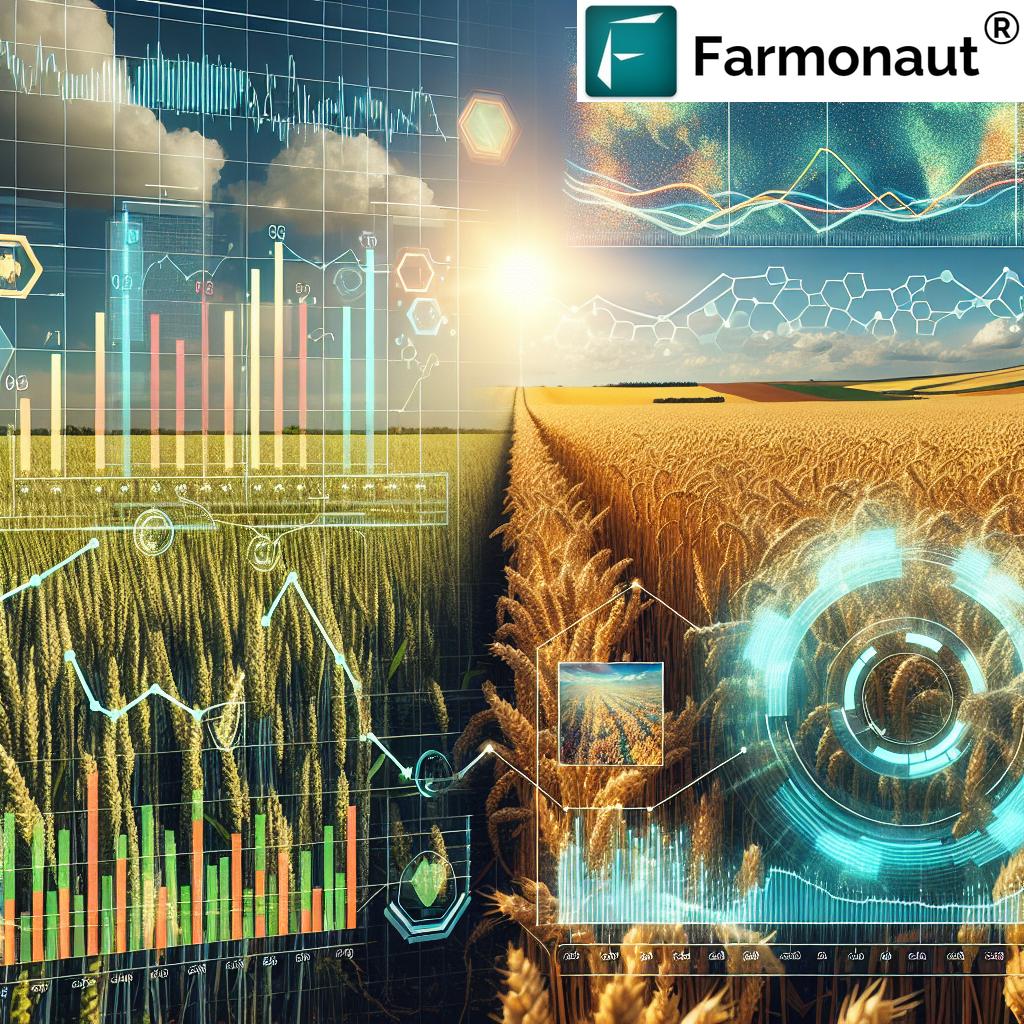
“Precision agriculture tools can increase crop yields by up to 20% while reducing water usage by 30%.”
In today’s rapidly evolving agricultural landscape, the convergence of technology and farming practices has opened up new horizons for farmers, traders, and investors alike. At Farmonaut, we’re at the forefront of this agricultural revolution, providing cutting-edge solutions that empower stakeholders across the agricultural value chain. Our mission is to make precision agriculture accessible and affordable, driving efficiency, sustainability, and profitability in the sector.
In this comprehensive guide, we’ll explore the intricate world of agricultural futures trading and how our advanced tools can help you navigate this complex marketplace. We’ll delve into crop risk management strategies, the power of farm data analytics, and how precision agriculture is reshaping the future of farming. Whether you’re a seasoned trader looking to refine your strategies or a farmer aiming to optimize your crop yields, this blog post will provide you with valuable insights and practical tools to succeed in the ever-changing agricultural landscape.
The Evolution of Agricultural Futures Trading
Agricultural futures trading has come a long way since its inception. Today, it stands as a cornerstone of global commodity markets, providing essential risk management tools for farmers, processors, and traders. Let’s explore how this market has evolved and why it’s more relevant than ever in today’s data-driven agricultural ecosystem.
Understanding Agricultural Futures
Agricultural futures are standardized contracts that obligate the buyer to purchase a specific quantity of an agricultural commodity at a predetermined price on a future date. These contracts serve several crucial purposes:
- Risk Management: Farmers can lock in prices for their future harvests, protecting themselves against market volatility.
- Price Discovery: Futures markets help in determining fair prices for commodities based on supply and demand factors.
- Market Efficiency: They facilitate smoother transactions between producers and consumers of agricultural goods.
The agricultural futures market has grown exponentially over the years, with a wide range of commodities now being traded, including wheat, corn, soybeans, cotton, and many others.
The Role of Technology in Modern Agricultural Trading
The advent of technology has revolutionized agricultural futures trading. Here’s how:
- Real-time Data Access: Traders now have instant access to market data, weather forecasts, and crop condition reports.
- Advanced Analytics: Sophisticated algorithms help in analyzing vast amounts of data to identify trading opportunities.
- Automated Trading: Many trades are now executed by computers based on pre-set parameters, increasing market efficiency.
- Improved Risk Assessment: Better data and analytics allow for more accurate risk assessment and management.
At Farmonaut, we’re proud to be at the forefront of this technological revolution in agriculture. Our satellite-based farm management solutions provide real-time insights that can be invaluable for both farmers and traders in the agricultural futures market.
Precision Agriculture: The Game-Changer in Crop Yield Optimization

Precision agriculture is transforming the way we approach farming, offering unprecedented opportunities for crop yield optimization. By leveraging advanced technologies, farmers can make data-driven decisions that significantly improve productivity and resource efficiency.
Key Components of Precision Agriculture
- Satellite Imagery: High-resolution satellite images provide valuable insights into crop health, soil moisture, and other critical metrics.
- IoT Sensors: On-ground sensors collect real-time data on soil conditions, weather, and crop growth.
- Data Analytics: Advanced algorithms process the collected data to generate actionable insights.
- Variable Rate Technology: Enables precise application of inputs like fertilizers and pesticides based on specific field conditions.
Farmonaut’s platform integrates these components to provide a comprehensive solution for precision agriculture. Our satellite-based crop health monitoring system offers real-time insights into vegetation health (NDVI), soil moisture levels, and other critical metrics, enabling farmers to make informed decisions about irrigation, fertilizer usage, and pest management.
The Impact of Precision Agriculture on Crop Yields
The adoption of precision agriculture techniques has shown remarkable results in improving crop yields:
- Increased Productivity: Precision farming can lead to yield increases of up to 20% for many crops.
- Resource Efficiency: Water usage can be reduced by up to 30% through precise irrigation management.
- Cost Reduction: Targeted application of inputs can significantly lower operational costs.
- Environmental Benefits: Reduced use of chemicals and water contributes to more sustainable farming practices.
By leveraging Farmonaut’s AI-driven Jeevn AI Advisory System, farmers can receive personalized recommendations for crop management, further enhancing the benefits of precision agriculture.
Leveraging Farm Data Analytics for Informed Decision-Making
In the era of big data, farm data analytics has emerged as a powerful tool for both farmers and traders in the agricultural futures market. By harnessing the power of data, stakeholders can make more informed decisions, leading to improved outcomes across the board.
The Power of Data in Agriculture
Farm data analytics offers numerous benefits:
- Predictive Yield Modeling: By analyzing historical data and current conditions, we can more accurately forecast crop yields.
- Risk Assessment: Data analytics helps in identifying potential risks to crops, allowing for proactive mitigation strategies.
- Market Trend Analysis: Historical price data and market trends can be analyzed to inform trading decisions.
- Resource Optimization: Data-driven insights enable more efficient use of water, fertilizers, and other inputs.
Farmonaut’s platform leverages advanced data analytics to provide these insights, helping farmers optimize their operations and traders make more informed decisions in the futures market.
Integrating Data Analytics with Futures Trading
The integration of farm data analytics with futures trading can lead to more sophisticated and effective trading strategies:
- Enhanced Price Forecasting: By incorporating real-time crop health data and yield predictions, traders can develop more accurate price forecasts.
- Improved Risk Management: Better understanding of crop conditions and potential yields allows for more effective hedging strategies.
- Identification of Trading Opportunities: Data analytics can help identify market inefficiencies and potential arbitrage opportunities.
Our blockchain-based traceability solution further enhances the value of data in the agricultural supply chain, ensuring transparency and trust in the journey from farm to consumer.
Smart Farming Technologies: The Future of Agriculture
Smart farming technologies are rapidly transforming the agricultural landscape, offering new possibilities for efficiency, sustainability, and profitability. These technologies encompass a wide range of innovations, from AI-driven crop management systems to autonomous farm equipment.
Key Smart Farming Technologies
- AI and Machine Learning: These technologies power predictive analytics, enabling more accurate forecasting of crop yields, pest outbreaks, and market trends.
- Drone Technology: Drones equipped with multispectral cameras provide detailed aerial imagery for crop monitoring and analysis.
- Robotics: Automated systems for planting, harvesting, and crop management reduce labor costs and increase efficiency.
- Blockchain: Ensures transparency and traceability in the agricultural supply chain.
Farmonaut’s platform incorporates many of these smart farming technologies, particularly in our AI-driven advisory system and blockchain-based traceability solutions.
The Impact of Smart Farming on Agricultural Futures
The adoption of smart farming technologies is having a profound impact on agricultural futures trading:
- Increased Production Certainty: More accurate yield predictions lead to more stable futures prices.
- Enhanced Quality Control: Better crop management results in higher quality produce, potentially affecting futures contract specifications.
- Sustainability Premium: As sustainable farming practices become more widespread, we may see a premium placed on futures contracts for sustainably produced commodities.
By leveraging Farmonaut’s smart farming solutions, both farmers and traders can stay ahead of these market trends and make more informed decisions.
Crop Risk Management Strategies in the Digital Age
“Agricultural futures trading accounts for over $1 trillion in annual global transactions, with corn being the most traded commodity.”
In an era of climate change and market volatility, effective crop risk management is more crucial than ever. Digital technologies are providing new tools and strategies for managing these risks, both for farmers and for traders in the agricultural futures market.
Key Risk Factors in Agriculture
- Weather Variability: Extreme weather events can significantly impact crop yields.
- Pest and Disease Outbreaks: These can cause substantial crop losses if not managed properly.
- Market Price Volatility: Fluctuations in commodity prices can affect farm profitability.
- Policy Changes: Agricultural policies and regulations can impact production costs and market access.
Digital Solutions for Crop Risk Management
Farmonaut offers several digital solutions to help manage these risks:
- Real-time Crop Monitoring: Our satellite-based monitoring system provides early detection of crop health issues, allowing for timely interventions.
- Weather Forecasting: Advanced weather prediction models help in planning farm activities and mitigating weather-related risks.
- Market Intelligence: Our platform provides up-to-date market information, helping farmers and traders make informed decisions.
- Risk Assessment Tools: We offer tools for assessing and quantifying various risks, aiding in the development of comprehensive risk management strategies.
These digital solutions not only help farmers manage risks more effectively but also provide valuable insights for traders in the agricultural futures market.
Agricultural Commodity Price Forecasting: A Data-Driven Approach
Accurate price forecasting is crucial in agricultural futures trading. With the advent of big data and advanced analytics, we now have more sophisticated tools for predicting commodity prices.
Factors Influencing Agricultural Commodity Prices
- Supply and Demand: The fundamental drivers of price in any market.
- Weather Conditions: Can significantly impact crop yields and, consequently, prices.
- Global Economic Factors: Including currency exchange rates, trade policies, and economic growth rates.
- Technological Advancements: Improvements in farming technology can increase yields and affect prices.
Data-Driven Price Forecasting Techniques
At Farmonaut, we leverage various data sources and analytical techniques to provide more accurate price forecasts:
- Satellite Imagery Analysis: Our satellite-based crop monitoring provides real-time data on crop health and potential yields, which can be used to forecast supply.
- Machine Learning Models: We use advanced ML algorithms to analyze historical price data, weather patterns, and other relevant factors to predict future price movements.
- Sentiment Analysis: By analyzing news and social media data, we can gauge market sentiment and its potential impact on prices.
- Economic Modeling: We incorporate macroeconomic factors into our forecasting models for a more comprehensive analysis.
By combining these data-driven techniques with traditional fundamental and technical analysis, traders can develop more robust and accurate price forecasts.
Exploring Efficient Trading Strategies in Agricultural Futures
Efficient trading strategies are essential for success in the agricultural futures market. With the wealth of data and analytical tools now available, traders can develop more sophisticated and effective approaches.
Key Elements of Successful Trading Strategies
- Risk Management: Implementing proper risk controls, including stop-loss orders and position sizing.
- Diversification: Spreading risk across different commodities and contract months.
- Technical Analysis: Utilizing chart patterns, indicators, and other technical tools to identify trading opportunities.
- Fundamental Analysis: Incorporating supply and demand factors, weather forecasts, and other relevant data.
- Market Sentiment: Gauging the overall mood of the market and its potential impact on prices.
Leveraging Farmonaut’s Tools for Trading Strategies
Our platform provides several tools that can enhance trading strategies:
- Real-time Crop Data: Access to up-to-date information on crop health and potential yields can inform trading decisions.
- AI-driven Insights: Our Jeevn AI system provides valuable market insights that can be incorporated into trading strategies.
- Historical Data Analysis: Our extensive database allows for backtesting of trading strategies using historical data.
- Custom Alerts: Set up personalized alerts for specific market conditions or price levels.
By integrating these tools with traditional trading techniques, traders can develop more robust and effective strategies for the agricultural futures market.
The Role of Blockchain in Agricultural Supply Chains
Blockchain technology is revolutionizing agricultural supply chains, offering unprecedented levels of transparency, traceability, and efficiency. This has significant implications for both farmers and traders in the agricultural futures market.
Benefits of Blockchain in Agriculture
- Enhanced Traceability: Every step of the product’s journey from farm to consumer can be recorded and verified.
- Improved Food Safety: Quick identification of the source of contaminated products in case of food safety issues.
- Reduced Fraud: The immutable nature of blockchain records helps prevent fraud in the supply chain.
- Efficient Transactions: Smart contracts can automate and streamline transactions between parties.
Farmonaut’s Blockchain Solutions
Our blockchain-based traceability solution offers several key features:
- Real-time Tracking: Monitor the movement of agricultural products through the supply chain in real-time.
- Secure Data Sharing: Share relevant data with stakeholders while maintaining data privacy and security.
- Integration with IoT Devices: Seamlessly incorporate data from IoT sensors for comprehensive tracking.
- Smart Contract Functionality: Automate transactions and agreements between parties in the supply chain.
These blockchain solutions not only enhance supply chain efficiency but also provide valuable data that can inform trading decisions in the agricultural futures market.
Sustainability and Carbon Footprinting in Agriculture
Sustainability has become a critical concern in agriculture, with increasing focus on reducing the sector’s environmental impact. This shift towards sustainable practices is also influencing the agricultural futures market.
The Importance of Sustainable Agriculture
- Environmental Conservation: Sustainable practices help preserve soil health, water resources, and biodiversity.
- Climate Change Mitigation: Agriculture can play a significant role in reducing greenhouse gas emissions.
- Long-term Productivity: Sustainable practices ensure the long-term viability of agricultural operations.
- Consumer Demand: Growing consumer preference for sustainably produced food is driving market trends.
Farmonaut’s Sustainability Solutions
We offer several tools to help farmers and agribusinesses improve their sustainability:
- Carbon Footprint Tracking: Our platform provides real-time data on emissions, allowing businesses to monitor and reduce their environmental impact.
- Resource Optimization: Our AI-driven insights help in efficient use of water, fertilizers, and other inputs, reducing waste and environmental impact.
- Sustainable Practice Recommendations: We provide tailored advice on implementing sustainable farming practices based on specific farm conditions.
These sustainability solutions not only benefit the environment but can also lead to cost savings and potentially higher value for sustainably produced commodities in the futures market.
Navigating Market Trends: A Comprehensive Overview
Understanding and anticipating market trends is crucial for success in agricultural futures trading. Let’s explore some of the key trends shaping the market today and how Farmonaut’s tools can help you navigate them.
Current Market Trends in Agricultural Futures
| Commodity Name | Current Price (estimated) | Price Trend | Yield Optimization Potential with Precision Farming | Market Outlook |
|---|---|---|---|---|
| Corn | $5.50/bushel | Increasing | High | Bullish |
| Soybeans | $13.20/bushel | Stable | Medium | Neutral |
| Wheat | $6.80/bushel | Decreasing | High | Bearish |
| Cotton | $0.85/pound | Increasing | Medium | Bullish |
Leveraging Farmonaut’s Tools for Market Analysis
Our platform offers several features to help you stay ahead of market trends:
- Real-time Data Dashboard: Access up-to-date information on crop conditions, weather patterns, and market prices.
- Predictive Analytics: Our AI-driven models provide forecasts on potential yield and price movements.
- Custom Reports: Generate tailored reports on specific commodities or market segments.
- Alert System: Set up notifications for significant market events or price movements.
By leveraging these tools, traders can make more informed decisions and develop strategies that align with current market trends.
Optimizing Portfolios: Balancing Risk and Reward
Portfolio optimization is a crucial aspect of successful agricultural futures trading. It involves finding the right balance between potential returns and acceptable levels of risk.
Key Principles of Portfolio Optimization
- Diversification: Spreading investments across different commodities and contract months to reduce risk.
- Risk Assessment: Evaluating the potential risks associated with each investment.
- Return Expectations: Setting realistic return goals based on market conditions and risk tolerance.
- Regular Rebalancing: Adjusting portfolio allocations to maintain desired risk-return profile.
Using Farmonaut’s Tools for Portfolio Optimization
Our platform offers several features to assist in portfolio optimization:
- Risk Analysis Tools: Evaluate the potential risks associated with different commodities and contract months.
- Performance Tracking: Monitor the performance of your portfolio in real-time.
- Scenario Analysis: Test how different market conditions might affect your portfolio.
- Optimization Algorithms: Use our AI-driven algorithms to suggest optimal portfolio allocations based on your risk preferences.
By leveraging these tools, traders can create more balanced and potentially more profitable portfolios.
The Future of Agricultural Futures Trading
As we look to the future, several trends are likely to shape the landscape of agricultural futures trading:
- Increased Use of AI and Machine Learning: These technologies will play a larger role in price forecasting and risk assessment.
- Greater Integration of Sustainability Metrics: Environmental factors may become more prominent in futures contracts and pricing.
- Expansion of Blockchain Technology: We expect to see wider adoption of blockchain for supply chain management and contract settlement.
- Rise of New Agricultural Commodities: Emerging crops and agricultural products may enter the futures market.
At Farmonaut, we’re committed to staying at the forefront of these trends, continuously updating our platform to provide the most advanced tools for agricultural futures trading.
Conclusion: Empowering Success in Agricultural Futures
The world of agricultural futures trading is complex and ever-changing, but with the right tools and insights, it presents tremendous opportunities. At Farmonaut, we’re dedicated to providing cutting-edge solutions that empower farmers, traders, and investors to navigate this landscape successfully.
From our satellite-based crop monitoring to our AI-driven advisory systems, from our blockchain traceability solutions to our advanced data analytics, we offer a comprehensive suite of tools designed to optimize crop yields, manage risks, and inform trading decisions.
As we move forward, the integration of technology and agriculture will only deepen, opening up new possibilities for efficiency, sustainability, and profitability. By staying informed, leveraging advanced tools, and adapting to market trends, you can position yourself for success in the exciting world of agricultural futures.
Ready to unlock the potential of precision farming and data-driven trading? Explore our solutions today:
For developers interested in integrating our powerful API into their own applications, check out our API Developer Docs.
FAQ
Q: What is Farmonaut?
A: Farmonaut is a pioneering agricultural technology company that offers advanced, satellite-based farm management solutions. We provide real-time crop health monitoring, AI-based advisory systems, blockchain-based traceability, and resource management tools to make precision agriculture affordable and accessible to farmers worldwide.
Q: How can Farmonaut’s tools help in agricultural futures trading?
A: Farmonaut’s tools provide real-time data on crop health, potential yields, and market trends. This information can be invaluable for making informed decisions in futures trading, helping to assess supply levels, predict price movements, and manage risks more effectively.
Q: Is Farmonaut suitable for small-scale farmers?
A: Yes, Farmonaut is designed to be accessible and affordable for farmers of all scales. Our solutions can be particularly beneficial for small and medium-sized farms looking to leverage precision agriculture techniques without significant upfront investment.
Q: How does Farmonaut’s blockchain solution enhance supply chain transparency?
A: Our blockchain-based traceability solution records every step of a product’s journey from farm to consumer. This creates an immutable record that enhances transparency, reduces fraud, and builds trust among all stakeholders in the supply chain.
Q: Can Farmonaut’s tools help in improving sustainability in agriculture?
A: Absolutely. Our platform includes features for carbon footprint tracking, resource optimization, and sustainable practice recommendations. These tools help farmers and agribusinesses reduce their environmental impact while often also improving efficiency and reducing costs.


